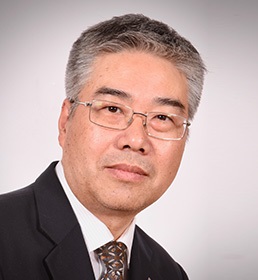New leadership is needed to make AI
a project partner
Interview with Prof. Dr. Ronggui Ding
Vice President for Research & Publications
International Project Management Association

Interviewed by Yasmina Khelifi
International Correspondent, PM World Journal
Paris, France
Introduction to the interviewee
Dr. Ronggui Ding is the Vice-President for Research and Publications at the International Project Management Association (IPMA) and a professor at the School of Management of Shandong University. He holds a Bachelor of Science degree in Applied Mathematics, a Master of Engineering degree in Mining Engineering, and a Ph.D. degree in Systems Engineering. He has worked as a consultant in operation management or project management for a long time in IT enterprises, engineering construction, and other enterprises, and has also served as a government department, and participated in or managed many IT or engineering projects. In addition to undertaking project management-related courses for senior managers at several universities in China, he also holds lectures for project managers in universities in the United Kingdom, Italy, and other countries, and is one of the most popular trainers in the project management industry in China.
Since 1994, when he was studying in Japan, Professor Ding has been researching the interaction between artificial intelligence and management decision-making, and the project governance mechanism of human-computer interaction. He has undertaken a number of research projects such as the National Natural Science Foundation of China, published dozens of academic papers in top international academic journals, and his monographs such as “Taiji Logic – Chinese Wisdom in Project Governance” have been welcomed by a large number of readers from different countries, and in 2007 he was awarded the title of New Century Excellent Talent by the Ministry of Education of China.
Professor Ding is the deputy director of the Project Management Committee of the China Association of Engineering Consultants and the core expert on project management of the China Software Industry Association. Since 2005, he has been involved in a large number of IPMA project management excellence awards, successively as assessor, Team-Lead-Assessor, member of the award board, final judge, etc. He visited projects in Germany, Russia, Italy, Dubai, Mauritius, Bangladesh, and other countries. Since 2019 he has been the Research Coordinator of the IPMA and since 2022 he has been the IPMA Vice-President for Research.
Interview
Q1: First of all, thank you for accepting an interview request from PMWJ. How is AI going to transform the world of project management?
Prof. Dr. Ding Ronggui (Ding): Thank you, Yasmina. The changes that AI will make to the project management world are mainly in the following aspects:
AI will change the rules and ethics of project management. One of the characteristics of project management is the interaction between people from different cultural backgrounds and expertise, which means that the effectiveness of the cooperation between people will greatly affect the success of the project. The project management mechanism and project governance mechanism are based on the relationship between people. Unlike previous machines and information tools, AI will be involved in project management as a new partner rather than a tool, and the rules of future project management need to add two dimensions, not only to deal with the cooperative relationship between people, but also to deal with the cooperative relationship between people and AI, and the cooperative relationship between AI adopted by different stakeholders.
Data governance, intellectual property governance, etc., are all new rules brought about by these new relationships. In addition, not only does AI need to meet human needs, but also human needs to meet AI’s needs, which inevitably raises moral and ethical issues. There used to be a well-known “Three Laws of Robotics”, that is, robots must not harm humans, or sit idly by and watch humans be harmed; robots must obey human orders unless they violate the first law; and robots must protect themselves unless they violate the first or second law. The scope of AI is broader than that of robots, and what are the principles for the development of AI in project management, and what ethics need to be followed in using AI to carry out project management activities, etc., will become major issues in project management fields.
AI will transform the efficiency and reliability of project management. Due to its strong learning and construction capabilities, AI can greatly improve the efficiency of solving problems that can be solved by using scientific thinking in project management, such as generating project reports, optimizing scheduling, cost management, and quality control, etc.. AI can also allocate project resources more economically, agilely and effectively. Of course, these efficiency improvements require the support of a large amount of basic data, which means that it must first go through a highly mature digitization process. If the digital maturity level of all stakeholders in the project is not consistent, it will be difficult for AI to achieve the desired effect in improving efficiency, and even the inconsistencies of interfaces can bring side effects to the dynamic and complex system of project management.
AI will improve the creativity and value of project management. With the help of digital twin technology, people can enter the digital project world from the real project world, and these digital worlds can be reconstructed and imagined by changing parameters and assumptions, and then the reconstructed and imagined digital world can be de-twin into the real management world. The combination of AI’s superior knowledge acquisition and knowledge deduction capabilities will improve the creativity of project managers, and the ability to build new systems with simulation can help project managers achieve controllable innovation and increase the value of projects.
Q2: What skills will project managers need in the age of AI?
More…
To read entire interview, click here
How to cite this work: Khelifi, Y. (2024). New leadership is needed to make AI a project partner, Interview with Prof. Dr. Ronggui Ding, IPMA Vice President Research, PM World Journal, Vol. XII, Issue VI, April. Available online at https://pmworldlibrary.net/wp-content/uploads/2024/04/pmwj140-Apr2024_Khelifi-Interview-with-Prof-Ronggui-Ding.pdf
About the Interviewer

Yasmina Khelifi
Paris, France
![]()
Yasmina Khelifi, PMP, PMI- ACP, PMI-PBA is an experienced project manager in the telecom industry. Along with her 20-year career at Orange S.A. (the large French multinational telecommunications corporation), she sharpened her global leadership skills, delivering projects with major manufacturers and SIM makers. Yasmina strives for building collaborative bridges between people to make international projects successful. She relies on three pillars: project management skills, the languages she speaks, and a passion for sharing knowledge.
She is a PMP certification holder since 2013, a PMI- ACP and PMI-PBA certification holder since 2020. She is an active volunteer member at PMI France and PMI UAE, and a member of PMI Germany Chapter. French-native, she can speak German, English, Spanish, Italian, Japanese and she is learning Arabic. Yasmina loves sharing her knowledge and experiences at work, in her volunteers’ activities at PMI, and in projectmanagement.com as a regular blogger. She is also the host and co-founder of the podcast Global Leaders Talk with Yasmina Khelifi to help people in becoming better international leaders.
Yasmina can be contacted at https://yasminakhelifi.com/ or LinkedIn: https://www.linkedin.com/in/yasminakhelifi-pmp-telecom/
Visit her correspondent profile at https://pmworldlibrary.net/yasmina-khelifi/
To view other works by Yasmina, visit her author showcase in the PM World Library at https://pmworldlibrary.net/authors/yasmina-khelifi/









